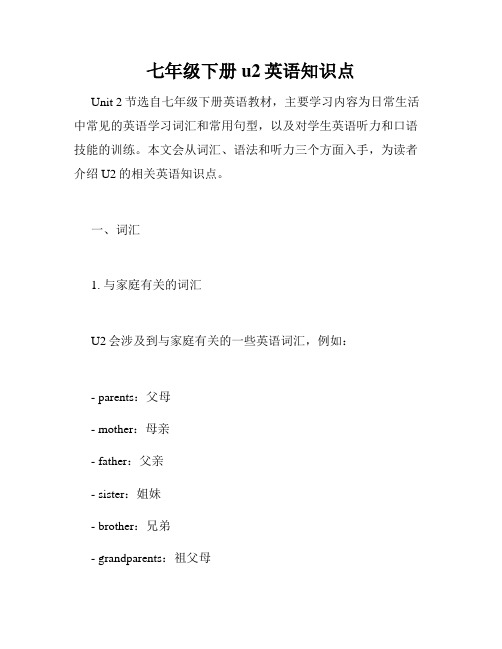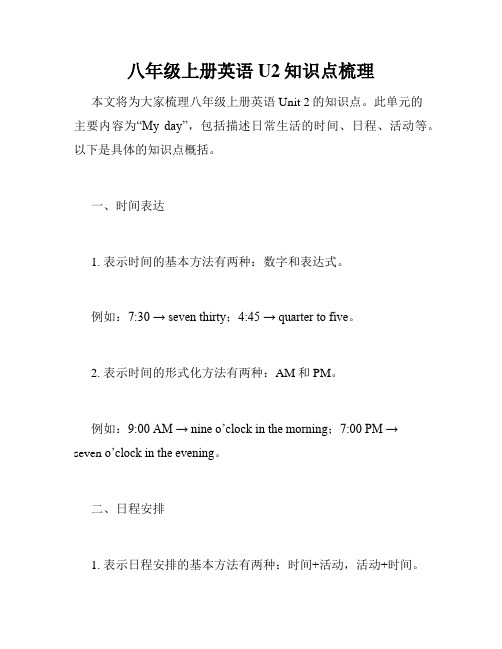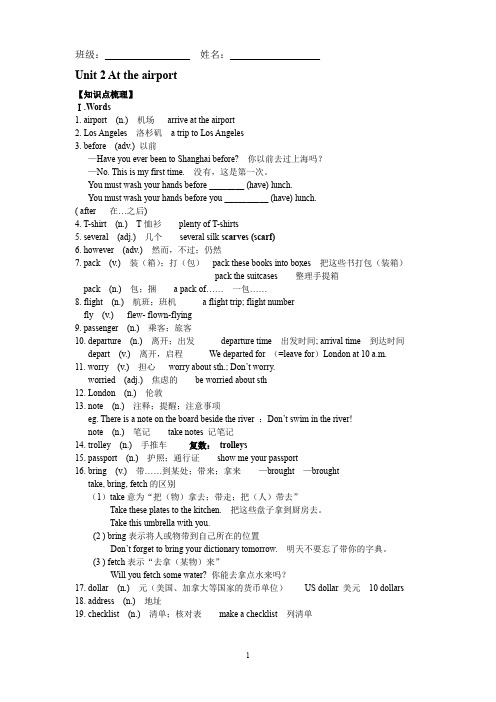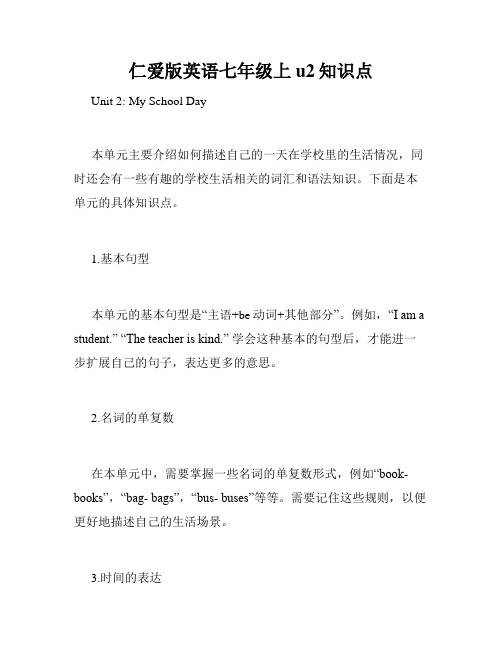U2知识点归纳
七年级下册u2英语知识点

七年级下册u2英语知识点Unit 2节选自七年级下册英语教材,主要学习内容为日常生活中常见的英语学习词汇和常用句型,以及对学生英语听力和口语技能的训练。
本文会从词汇、语法和听力三个方面入手,为读者介绍U2的相关英语知识点。
一、词汇1. 与家庭有关的词汇U2会涉及到与家庭有关的一些英语词汇,例如:- parents:父母- mother:母亲- father:父亲- sister:姐妹- brother:兄弟- grandparents:祖父母- aunt:姑妈/舅妈- uncle:叔叔/舅舅2. 数字词汇识别数字也是英语学习的一部分。
在U2中,会遇到一些数字词汇:- ten:十- twenty:二十- thirty:三十- forty:四十- fifty:五十- sixty:六十- seventy:七十- eighty:八十- ninety:九十- one hundred:一百3. 食物类词汇U2也会介绍一些英语中常见的食物类词汇:- apple:苹果- banana:香蕉- bread:面包- cheese:奶酪- chicken:鸡肉- fish:鱼- ice cream:冰淇淋- meat:肉类- milk:牛奶- orange:橙子4. 人称代词人称代词在英语中也很常见,U2中会出现he、she、they等人称代词,一定要掌握好它们的使用。
二、语法1. be 动词在U2中,be动词的使用较为频繁,且需要根据主语的不同来做出相应的变化。
例如:- I am a student.- She is a teacher.- We are classmates.2. have gothave got是英语中表达“有”这个动作的一种方式,它的构成方式为:主语+have got+物品。
例如:- I have got a pen.- She hasn't got a hat.3. there is/arethere is/are也是英语中常用的句型,表示“有”的意思,其中is/are的使用取决于所描述的事物的单复数。
八年级上册英语U2知识点梳理

八年级上册英语U2知识点梳理本文将为大家梳理八年级上册英语Unit 2的知识点。
此单元的主要内容为“My day”,包括描述日常生活的时间、日程、活动等。
以下是具体的知识点概括。
一、时间表达1. 表示时间的基本方法有两种:数字和表达式。
例如:7:30 → seven thirty;4:45 → quarter to five。
2. 表示时间的形式化方法有两种:AM和PM。
例如:9:00 AM → nine o’clock in the morning;7:00 PM → seven o’clock in the evening。
二、日程安排1. 表示日程安排的基本方法有两种:时间+活动,活动+时间。
例如:6:00 AM → get up;7:00 AM → have breakfast。
2. 表示日程安排的常见活动包括:get up、havebreakfast/lunch/dinner、go to school/bed、have classes、have a break、do homework、watch TV、play sports/games/music、go shopping、have a party。
三、常用语句1. 询问时间:What time is it? What’s the time? Do you have the time?2. 描述日程安排:What’s your plan for today/tomorrow? What do you usually do on weekends?3. 提供建议:You’d better go to bed early tonight. You should do more exercise.四、疑问句1. 一般疑问句:肯定回答用“Yes,主语+助动词”;否定回答用“No,主语+助动词+not”。
例如:Do you usually wake up at 6:30 AM? Yes,I do. / No,I don’t.2. 特殊疑问句:用来询问具体事实,通常以疑问词开头。
U2知识点归纳

班级:_________________ 姓名:__________________Unit 2 At the airport【知识点梳理】Ⅰ.Words1. airport (n.) 机场arrive at the airport2. Los Angeles 洛杉矶 a trip to Los Angeles3. before (adv.) 以前—Have you ever been to Shanghai before? 你以前去过上海吗?—No. This is my first time. 没有,这是第一次。
You must wash your hands before ________ (have) lunch.You must wash your hands before you __________ (have) lunch.( after 在…之后)4. T-shirt (n.) T恤衫plenty of T-shirts5. several (adj.) 几个several silk scarves (scarf)6. however (adv.) 然而,不过;仍然7. pack (v.) 装(箱);打(包)pack these books into boxes 把这些书打包(装箱)pack the suitcases 整理手提箱pack (n.) 包;捆 a pack of……一包……8. flight (n.) 航班;班机 a flight trip; flight numberfly (v.) flew- flown-flying9. passenger (n.) 乘客;旅客10. departure (n.) 离开;出发departure time 出发时间; arrival time 到达时间depart (v.) 离开,启程We departed for (=leave for)London at 10 a.m. 11. worry (v.) 担心worry about sth.; Don’t worry.worried (adj.) 焦虑的be worried about sth12. London (n.) 伦敦13. note (n.) 注释;提醒;注意事项eg. There is a note on the board beside the river :Don’t swim in the river!note (n.) 笔记take notes 记笔记14. trolley (n.) 手推车复数:trolleys15. passport (n.) 护照;通行证show me your passport16. bring (v.) 带……到某处;带来;拿来—brought —broughttake, bring, fetch的区别(1)take意为“把(物)拿去;带走;把(人)带去”Take these plates to the kitchen. 把这些盘子拿到厨房去。
仁爱版英语七年级上u2知识点

仁爱版英语七年级上u2知识点Unit 2: My School Day本单元主要介绍如何描述自己的一天在学校里的生活情况,同时还会有一些有趣的学校生活相关的词汇和语法知识。
下面是本单元的具体知识点。
1.基本句型本单元的基本句型是“主语+be动词+其他部分”。
例如,“I am a student.” “The teacher is kind.” 学会这种基本的句型后,才能进一步扩展自己的句子,表达更多的意思。
2.名词的单复数在本单元中,需要掌握一些名词的单复数形式,例如“book- books”,“bag- bags”,“bus- buses”等等。
需要记住这些规则,以便更好地描述自己的生活场景。
3.时间的表达在学校的生活中,时间的表达非常重要。
本单元会涉及到时间的表达方式,例如“8:30”可以说为“eight thirty”,“11:45”可以说为“eleven forty-five”。
学生需要注意这些表达,以免混淆时间。
4.疑问句“who”, “what”, “when”, “where”, “which” 等疑问词在英语中是很常见的。
在本单元中,学生将学会如何使用这些疑问词构造疑问句,例如“Who is your English teacher?” “What time do you have lunch?”等等。
5.语法知识本单元涉及到一些简单的语法知识,例如动词的三单形式,以及名词所有格的表达方式等等。
这些知识点的理解将有助于学生更好地掌握英语语言。
总体来说,本单元的知识点较为简单明了,但是需要学生花费时间积累和实践运用。
希望学生们能够善用教材和课堂时间,尽快掌握这些知识点,为自己的英语学习打下坚实的基础。
九上英语u2笔记

九上英语u2笔记九年级英语Unit 2笔记(人教版)一、重点单词。
1. stranger.- 名词,意为“陌生人”。
例如:Don't talk to strangers.(不要和陌生人说话。
)- 其形容词形式为“strange”,有“奇怪的;陌生的”意思。
如:a strange noise(奇怪的声音)。
2. relative.- 名词,“亲属;亲戚”。
例如:My relatives live in different cities.(我的亲戚住在不同的城市。
)3. put on.- 有“增加(体重);发胖”的意思,是一个动词短语。
例如:I have put on five pounds during the Spring Festival.(春节期间我长胖了五磅。
)它还有“穿上;上演”等其他意思,如:put on your coat(穿上你的外套);put on a play (上演一出戏剧)。
4. pound.- 名词,“磅(重量单位);英镑(货币单位)”。
例如:This box weighs two pounds.(这个盒子重两磅。
)I bought this book for ten pounds.(我花十英镑买了这本书。
)5. steal.- 动词,“偷;窃取”,其过去式为“stole”,过去分词为“stolen”。
例如:Someone stole my bike yesterday.(昨天有人偷了我的自行车。
)二、重点短语。
1. the Water Festival.- “泼水节”,是一个专有名词。
例如:The Water Festival is very interesting.(泼水节非常有趣。
)2. the Dragon Boat Festival.- “端午节”,专有名词。
People eat zongzi during the Dragon Boat Festival.(人们在端午节吃粽子。
九年级仁爱英语u2知识点

九年级仁爱英语u2知识点Unit 2: FriendshipFriendship is a beautiful and essential aspect of our lives. It brings joy, support, and warmth. However, to build and nourish genuine friendships, we need to understand certain key aspects. In this article, we will explore some important knowledge points about friendship in the context of Unit 2 of the Ninth Grade Ren'ai English textbook.1. What is Friendship?Friendship is more than just acquaintanceship; it involves a deep emotional connection and mutual trust between individuals. True friends are there for you through thick and thin, offering a shoulder to lean on and providing unwavering support. They are the ones who celebrate your successes and stand by you during difficult times.2. Qualities of a Good FriendA good friend possesses several important qualities. They are trustworthy, loyal, and honest. Trust is the foundation of any friendship. Without trust, a bond cannot truly be formed. Loyalty is also crucial; a good friend sticks by your side no matter what, offering unwavering support. Honesty is equally important. A true friend will tell you thetruth, even if it may be difficult to hear. They are willing to communicate openly and resolve conflicts.3. Building and Maintaining FriendshipsBuilding and maintaining friendships require effort and continuous investment. To develop a lasting bond, one must be willing to listen, be empathetic, and show genuine interest in the other person. Engaging in shared activities and creating memories together also help strengthen the friendship. Regular communication, whether through face-to-face interactions or virtual platforms, is vital to maintain the connection.4. Supporting Friends in Times of NeedTrue friends are there for each other during challenging times. Supporting a friend in need requires both sensitivity and understanding. Listening attentively without judgment is crucial. Sometimes, offering practical help or simply being present can make a significant difference. It is important not to minimize their feelings or provide shallow advice. Instead, validate their emotions and offer comfort.5. Dealing with ConflictsConflicts are inevitable in any relationship, including friendships. However, the key is to resolve conflicts in a healthy and respectfulmanner. Open communication is vital, allowing both parties to express their feelings and concerns. It is important to avoid blaming or criticizing the other person and instead focus on finding a solution that satisfies both parties.6. Cultural Perspectives on FriendshipFriendship is highly valued in different cultures worldwide. While the core principles of friendship remain universal, there may be slight variations in cultural norms and expectations. For example, in some cultures, maintaining friendships is a lifelong commitment, while in others, friendships may be more fluid. Understanding and respecting cultural differences enrich our perspective on friendships.In conclusion, friendship is a significant part of our lives, offering support, joy, and companionship. By understanding the qualities of a good friend, learning strategies to build and maintain friendships, being supportive in times of need, and resolving conflicts sensitively, we can cultivate and cherish meaningful friendships. Understanding different cultural perspectives on friendship broadens our understanding and appreciation for this essential aspect of human relationships. Let us cherish our friends and cultivate strong and lasting friendships.。
U2知识点归纳
Unit 2 知识点单词1. city 城市2. by metro 乘地铁3. on foot 步行4. by taxi 乘出租车5. moon月亮6. street街道7. near在...附近8. by乘9. bus公共汽车10. far from离...远11. ship船12. show出示13. basket篮子14. by bike 骑自行车15. by plane乘飞机16. by train 乘火车17.far 远18. town 城镇词组1. like… very much 非常喜欢……2. a new bike一辆新自行车3. live near City Library 住在市图书馆附近4. on Park Street在公园街5. in Sunshine Town 在阳光小镇6. ride a bike 骑自行车7. show his bike to Sam把自行车给萨姆看8. get there 到达那儿9. like riding喜欢骑车10. all through the town 穿越全城11. the wheels on the bus 公交车上的轮子12. too young 太年轻13.my uncle 我的叔叔14.live on Park Street住在公园街15e to school 来学校16. go to school 去学校17. sit in the basket坐在篮子里18.on Moon Street 在月亮街19. live near school 住着靠近学校20 . go home by bus 乘公交车回家21.your new home你的新家22. very big非常大23.go round and round 转啊转24. in the park在公园里25. my aunt我的阿姨26.live in Beijing住在北京27. go there去那里28.live near the park住在公园附近29. work on a big ship在一艘大船上工作30.many cities很多城市句型1.Can you talk about their features? 你能说说他们的特点吗?2.Do you like your new house? 你喜欢你的新房子吗?3.It’s far from school. 它离学校远。
(完整版)八年级上册U2知识点
Unit2 How often do you exercise? 一•重点单词用法1. housework 家务[U]do housework 做家务做家庭作业:do homework2. hardly 几乎不adv. 表频率hard adv. 努力地study hard 努力学习adj. 困难的,坚硬的It's hard to do sth. 做某事很困难3. once/ twice/ three times 一次/ 两次/ 三次对频率提问用“ how often ”4. Internet 互联网on the Internet 在网上surf the Internet 网上冲浪5. full n. 忙的,满的,饱的eg. Next week is full for me. 下周我很忙。
I'm full now. 我现在饱了。
The cup if full of water. 瓶子里装满了水。
be full of 充满.........6. maybe adv. 大概,或许,可能Maybe you are right.may be 情态动词+be 结构可能是You may be right.7. least adv. 最少,最小(最高级)比较级:less 原级:littleat least 至少,不少于8. health n. 健康healthy adj. 健康的healthily adv. 健康地keep/stay/be healthy= keep in good healtheg. We eat healthy food. 我们吃健康的食物。
We eat healthily. 我们吃地健康。
It's good for our health. 它对我们的健康有好处。
10. percent 百分之...90%:ninety percent11. online 在线的go online 上网buy sth. online 网上买某物12. although 虽然,尽管=though(引导让步状语从句),不能与but 连用eg. Although my grandpa is old, he looks healthy. 尽管我的爷爷老了,但是他看起来很健康。
七年级上册译林版英语知识点u2
七年级上册译林版英语知识点u2 U2单元主要涉及介绍人物、家庭和朋友的基本英语句型以及情态动词can和may的用法。
以下是本单元的重点知识点:一、人称代词人称代词指代人物,包括主格和宾格。
主格:I/you/he/she/it/we/they宾格:me/you/him/her/it/us/them二、be动词的用法be动词表示状态或者身份,包括am/is/are。
例如:I am a student.(我是一个学生。
)She is my friend.(她是我的朋友。
)三、情态动词can的用法can表示能力或者请求,用于表示能够做某事或者请求做某事。
例如:I can swim.(我会游泳。
)Can you help me, please?(请问你能帮我吗?)四、物主代词的用法物主代词表示所有,包括我的(my)、你的(your)、他/她的(his/her/its)、我们的(our)、你们的(your)、他们/她们的(their)。
例如:This is my pen.(这是我的笔。
)五、询问和回答家庭情况的句型询问:What’s your family like?回答:My family is small/big.我有三口人。
My family has three people.我有两个姐妹。
I have two sisters.六、情态动词may的用法may表示许可,用于询问或者答复允许做某事。
例如:May I go to the bathroom?(我可以去洗手间吗?)Yes, you may.(可以。
)七、祈使句的用法祈使句用于表示请求或者命令,常用动词原形加上主语you来构成。
例如:Open the door, please.(请开门。
)Do your homework now.(现在做作业。
)。
八年级英语u2知识点归纳总结
八年级英语u2知识点归纳总结八年级英语课程U2主要涉及到“Unit 2 What is the weather like?”,主要让学生了解天气状况的相关词汇和表达方式,并通过实际案例进行应用。
接下来我们来看一下本单元的几个重点知识点。
1. 天气现象本单元的主要学习内容是学习气候和天气状况的词汇。
关于天气现象的表达方式,主要有以下的几个要点:(1)天气名称:sunny(晴天)、cloudy(多云的)、windy(有风的)、rainy(雨天)、snowy(雪天)等。
(2)描述天气:It’s sunny and cool.(天气晴朗,凉爽宜人。
)、It’s raining cats and dogs.(暴雨倾盆)(3)询问天气:What’s the weather like?(今天天气怎么样?)2. 季节名称在此期间学习英文季节名称时,应了解四个季节的名称及其特点。
主要有如下几点:(1)春季:Spring,主要特点是温暖和花海。
(2)夏季:Summer,主要特点是炎热和沙滩。
(3)秋季:Autumn,主要特点是凉爽和硕果累累。
(4)冬季:Winter,主要特点是冷和雪。
3. 动词短语本单元的动词短语主要是用来描写天气的。
比如:(1)变化:change,The weather changes often in spring.(春季天气常常变化。
)(2)开始:begin,It began to rain five minutes ago.(五分钟前开始下雨。
)(3)停止:stop,The rain stopped after two hours.(两小时后,雨停了。
)(4)持续:last,How long will the snow last?(雪会持续多久?)4. 有关衣物的表达天气状况的变化,常常要求我们对穿着做出相应的调整。
因此,掌握关于衣物的表达方式,是非常重要的。
主要包括:(1)衣着:wear,What should I wear today?(我今天该穿什么?)(2)衣物名称:coat(大衣)、sweater(毛衣)、boots(靴子)等。
- 1、下载文档前请自行甄别文档内容的完整性,平台不提供额外的编辑、内容补充、找答案等附加服务。
- 2、"仅部分预览"的文档,不可在线预览部分如存在完整性等问题,可反馈申请退款(可完整预览的文档不适用该条件!)。
- 3、如文档侵犯您的权益,请联系客服反馈,我们会尽快为您处理(人工客服工作时间:9:00-18:30)。
e from =be from 来自 He is from Guangdong.=He _c_o_mes_f_ro_m_ GD
踢足球。 18. want to do sth.想要做某事
want ____ ______ to music. 想听音乐 want____ _____ in the next World Cup 想踢进下一届世界杯
19.hope to do sth. 希望做某事 hope _t_o_ w_a_tc_h_matches.希望观看比赛
5. time 次,回 many times a day 一天许多次
6.like playing volleyball 爱打排球 7.love playing tennis 爱打网球 8.enjoy swimming 爱游泳
go swimming 去游泳 9.What’s your favourite sport? =What sport do you like best?你爱什么运 动
10.What about you?你怎么样? What about + doing sth?做某事怎么样?
如:what about going swimming?
11.play ----- player 运动员 my favourite football player我最爱的足球运动
员
There are some_p_l_a_y_e_rs__ (play) on the ound. 12.a member of = in …中的一员
14.look +形容词 看起来… 如: look strong / young /beautiful/modern/good
15. play …well …打得好 =be good at …=do well in…擅长
Kitty swims well =kitty is a good swimmer. 游泳者 =Kitty _is__ g_o_o_d_a_t __sw_ i_m_m__in_g. =Kitty _d_o_e_s __w_e_ll __i_n_ _s_w_i_m_m.ing
16.In his free time. 在他的空闲时间 17. ① make sb +形容词
②make sb do sth
eg:1. Music __m_a_ke_s__m_e__h_a_p_py音. 乐让我开心 2. The teacher m__ak_e_sme _p_la_y _fo_ot_b_al_l .老师让我
e true 成为现实 我希望他的梦想成真 ________________________________
21.改否定句
1. 句中有 am /is /are / can 的直接加 not some 变为any, and 变为or. ① There is an old desk and some books in the
喜欢做什么? 27. make me feel great/good/hot/cold
让我感到棒极了/ 好/ 热/冷
28.read a lot of interesting books 看许多有趣的书。 an interesting book. 一本有趣的书
29.---I like fish. -----Me too.我也是。 30.Reading is fun . 阅读是件有趣的事。 31. talk about basketball.谈论篮球 talk about playing basketball.谈论打篮球 32.hero---- heroes英雄 Yao Ming and Wang Hao are my ______英雄
2.句中无am /is /are /can 的,在主语后加 don’t/doesn’t +V 原形,…
例子: ① Daniel does his homework every night.改否 _D__an_i_e_l d_o_e_s_n_’t_d_o__h_is_h_o_m__ew__o_rk_e_v_e_r_y_n_ig_h_t_. __ ②Her mother does housework every week.否 __H_e_r _m_o_th_e_r_d_o_e_s_n_’t_d_o_h_o_u_s_e_w_o_r_k_e_v_e_ry_w__e_ek_._ ③Mr Wu teaches us English this term. 否 _M__r_W_u__do_e_s_n_’_t _te_a_c_h_u_s__E_ng_l_is_h__th_i_s_t_er_m_.___
④We have some pets.否 ___W_e_d_o_n_’_t _h_a_v_e_a_n_y__p_e_ts_. ____________
22.改一般疑问句
23.Watch ball games on TV. 在电视上观看球赛。
24.love drawing 爱画画
25.stay at home 呆在家 stay ---- stays. 26. What else do you like to do ? =What other things do you like to do?你还
room.(改为否定句) __T_h_er_e_i_s_n’_t_a_n_o_ld__d_e_sk__o_r__an_y__b_oo_k_s__in_t_h_e_r_o_o_m. ②Amy can swim very well. (改否定句) __A__m_y__c_a_n_’t__s_w_im__v_e_r_y__w_e_l_l._____________
Unit2 复习
请大家用心记忆, 认真复习
1.let’s play sports. 让我们做运动 2.like walking 爱散步. go walking 去散步
3. really.的确,确实 You are r e_a_l_ly__ nice .
4. walk 散步,走 ①walk to my bowl 走到我的碗边 ②walk to school 走到学校 = go to school on foot ③walk home 走回家 = go home on foot
